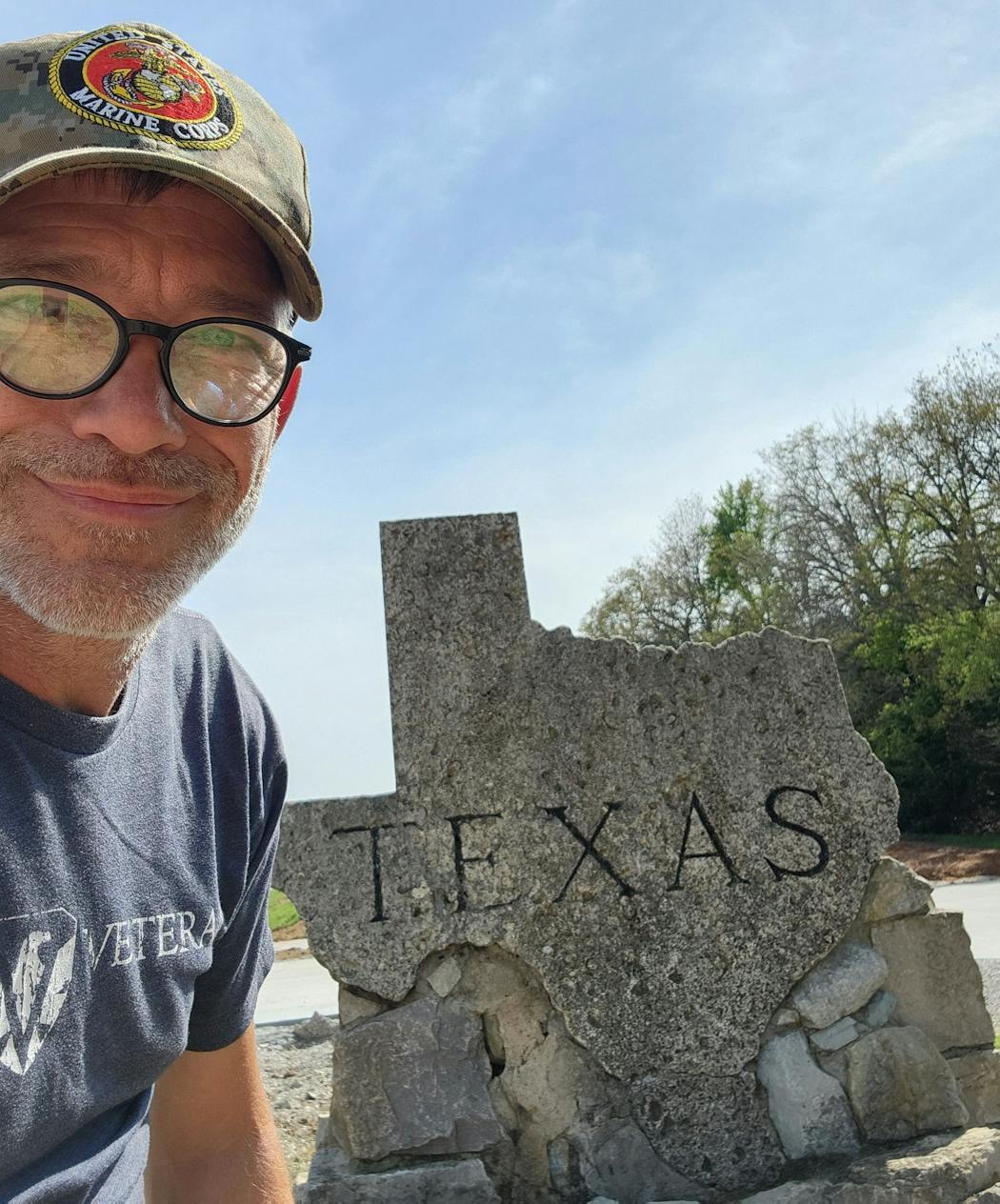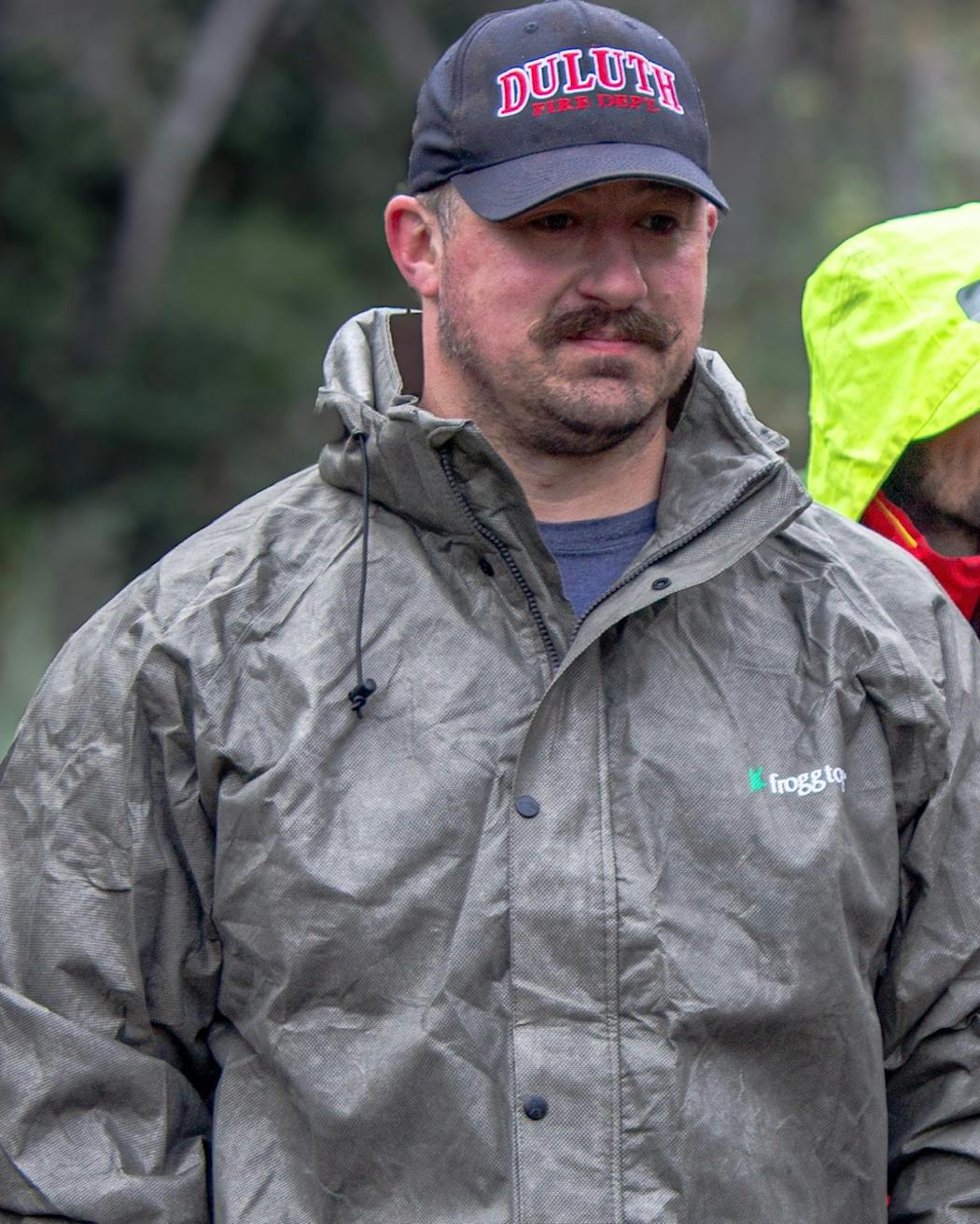On April 8, Daniel Crawford looked up at the sky. He had arrived in Texas the previous week on foot from Minnesota — he'd spent two months getting there, walking more than 1,000 miles. Crawford wanted to view the solar eclipse and had figured Texas would most likely offer a sunny day.
The sky was cloudy.
Still, Crawford wasn't overly disappointed. Viewing the eclipse was just one purpose of the trek, but he had more important goals.
"You can be the right place at the right time and things aren't always going to happen," he said. "I wasn't there for the eclipse, I was there for the light and the smiles and the joy."
Crawford's main reason for his 1,000 Mile Gratitude Walk was to promote 23rd Veteran, a Duluth-based organization that helps veterans, like Crawford, exorcise whatever demons they've grappled with since their time in the service.
The organization's 14-week program helps vets reshape their memories, harnessing brain chemistry to change their responses to potential triggers — loud noises, flashing lights, guns — by linking them to positive experiences.
Founder Mike Waldron named 23rd Veteran after an oft-repeated statistic that 22 veterans a day die by suicide. (It has since been adjusted — recorded suicides among veterans averaged 17.5 per day in 2021 — but that was the accepted rate when Waldron started the program in 2015.) Waldron himself once suffered mental health problems after being stationed in Iraq for a year.
"I was almost one of those 22 veterans," he said.
Crawford, too, struggled after leaving the Marines in 1995. He had left his wife and son, was drinking heavily every night, worked on and off, took odd jobs, lived on the streets some of the time.
"I couldn't find the joy, I couldn't find the happiness, I couldn't find the purpose, I couldn't find people I really could relate to," he said. "It was tough."
In 2021, he saw something about 23rd Veteran on social media. That the program was free made him suspicious. He thought it might be a way to scam veterans.
"I applied for it, just to see what they were going to ask in return, and I found that what they asked in return was to show up — physical and mentally show up — and let the program work," he said.
So in April 2022, Crawford found himself on a sailboat in Florida, sober for the first time in years, in a group of nine strangers, his life about to change.
Rewiring the brain
Perhaps surprisingly, Waldron calls his time in Iraq in 2003, during the United States-led invasion of the country, "one of the most enjoyable things" he did while in the Marines. He never felt afraid, saw times under fire as an opportunity to show what he could do.
"We trained so hard for so long," Waldron said. "To be able to go in and see what happened when we put that hard work into action, it felt like we actually got to serve a purpose rather than just training."
But after he returned to the United States in 2004, the nightmares started. In the dreams, he found himself in combat, fighting the enemy in Iraq, without a weapon to protect himself.
Just dreams, he thought. Waldron exerted control on his emotions, refusing to be upset.
But the dreams got more graphic. Instead of fighting the enemy, he was fighting people he knew, even his girlfriend's 5-year-old son.
"They would be in front of me, suffering, and knowing I was doing it," Waldron said. "It was a really difficult time in life, when you wake up from something like that, and 10 minutes later you're having breakfast with him."
In 2008, he suffered a panic attack — chest pain, a raising pulse, dimming vision. The attacks started happening multiple times a day, often triggered by things in his environment. The sight of a plane, for instance, would make him sick to his stomach.
"My subconscious thought I was going into combat," he said. "It was really hard to live; it was so scary."
He decided physical fitness would help. He moved to Duluth from Indiana and started skiing, working out at a gym, talking to people. He realized he needed social interaction as much as exercise.
"It became really clear that my brain had changed when I was in combat," he said.
That's what led him to study brain-derived neurotrophic factor (BDNF), a protein in the brain that is elevated with exercise. BDNF soothes anxiety and depression and is thought to encourage brain plasticity, or the brain's ability to change with circumstances.
"People use the term rewire a lot," Waldron said. "Our brains are constantly evolving and growing and learning."
23rd Veteran's therapy program aims to use exercise-generated BDNF and camaraderie to turn vets' trauma-inducing fears into feelings that are positive. It resembles the widely used exposure therapy, in which patients are exposed to things they fear — like flying or heights — then goes a step further to create happier associations.
Participants start with a week in a rugged outdoor environment amid a small group of strangers. As they rely on each other, far from their normal lives, they become close and talk about their post-combat emotions and experiences.
After that week, they're required to show up for rigorous workouts three times a week. Then, their heart rates still elevated, they sit down and talk about things they're grateful for.
"We keep hitting those same neuro linkages, over and over," Waldron said.
Meanwhile, the group makes excursions every other weekend to places that could potentially evoke memories of battleground trauma, such as loud noises or screaming, but in a friendly environment: a crowded restaurant, trampoline park, bowling alley, even a firing range.
"We've had more than130 people go through the firing range, and never had a bad experience," Waldron said. Rather than sounds and smells activating trauma, they're "shooting weapons and just having a blast."
Learning to live with demons
23rd Veteran is holding the 16th session of its program; participants will graduate June 1. Andy Beck of Superior, Wis., is in that group.
Beck first heard of 23rd Veteran some years ago, but resisted signing up for a session, even though as a vet and now a Duluth firefighter and paramedic, he was no stranger to lingering trauma. (23rd Veteran is opening its program to first responders, Waldron said.)
"I still wasn't quite ready to do it emotionally, because I knew it was going to be a challenge," Beck said. "Part of the program is basically stripping you down to who you are, to get at the basics of where you want to be, and essentially learning how to live with the demons in your life."
His time in Iraq in 2003, Beck said, had left him "essentially a different person." But at that time the military offered little emotional support.
"You see things over there that affect you the rest of your life and we came back with no playbook on how to deal with it," he said. "We basically got home and they were like, 'Go enjoy time with your family.'"
The first week, his 23rd Veteran group hiked seven or eight miles into the California mountains. At night, they talked about their emotions, about issues they'd been dealing with, things they didn't fully comprehend. Beck was ready.
"As difficult as it was, it was basically a safe place to do it," he said. "At that point I personally was ready to bare it all and see if it helped me."
It did.
"We don't throw the phrase 'life changing' out there lightly — this trip was truly life changing for me," Beck said. "It made me aware of how I can be a better husband, how I can be a better father, how I can be a better friend. ... It's not just a getaway, it's not just a fun trip. It really is rewriting how you handle stuff, how you react to stuff."
Beck celebrated the success with a new tattoo: 23XVI, for 23rd Veteran's 16th group.
Meanwhile, Crawford has been volunteering with 23rd Veteran, and plans to lead a group of his own soon. In the meantime, he celebrated the program's success by, well, walking to Texas.
"I am grateful for every piece of crap day that I had to bring me to today," Crawford said. The program is about "being grateful for the small things and realizing those things can be very powerful. ... We start seeing some smiles come back, from people that normally don't leave the house, and it's magical."
And as Crawford connected with people along his route — especially veterans — he found there are plenty of people out there who could use help.
"Everywhere I went, I ran into veterans that were in pain," he said. "And that's not just the veterans, that's everybody."
23rd Veteran will hold fundraising Ruck Marches, a form of military training, on June 1 at Mont Du Lac Resort in Duluth, and Sept. 7 at Anoka High School. Volunteer participants are asked to bring a rucksack or backpack loaded with food and clothing to donate, and will hike a steep route of either 2 miles or 10 miles. The family and dog-friendly events will include music, refreshments and awards ceremonies.

The 5 best things our food writers ate this week

A Minnesota field guide to snow shovels: Which one's best?

Summer Camp Guide: Find your best ones here

Lowertown St. Paul losing another restaurant as Dark Horse announces closing



